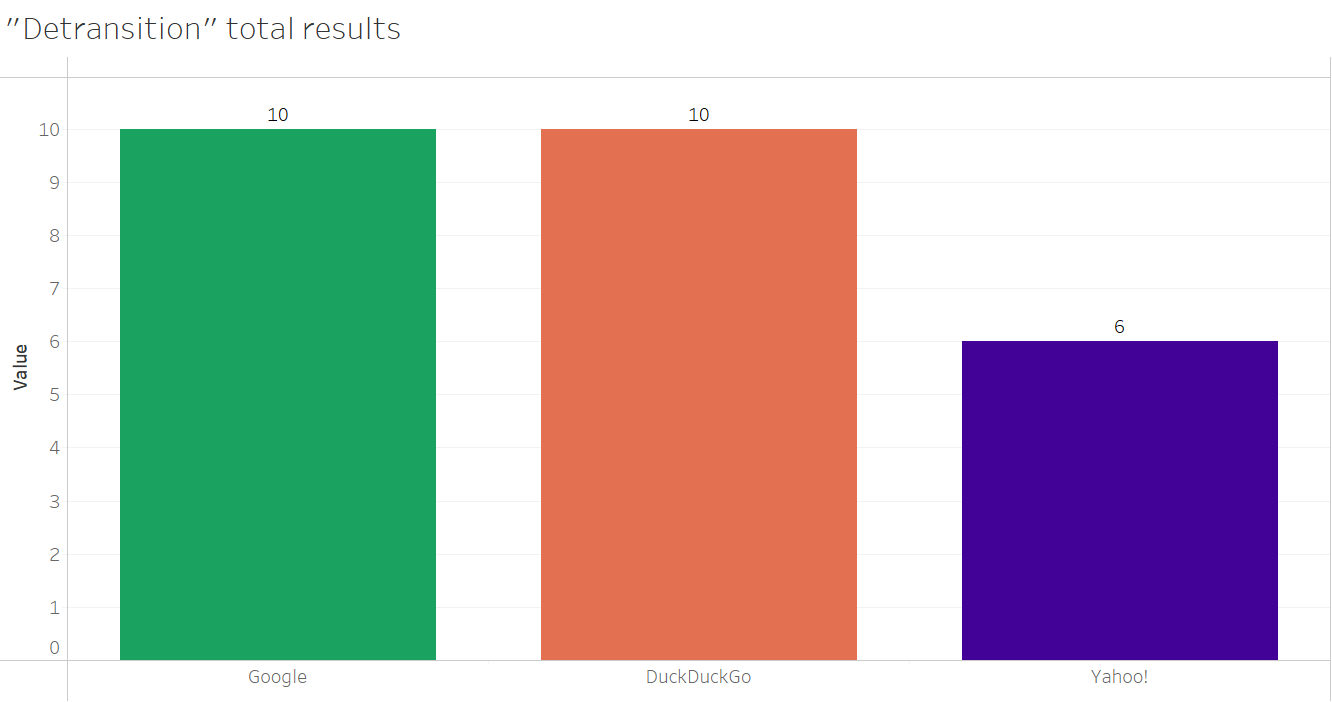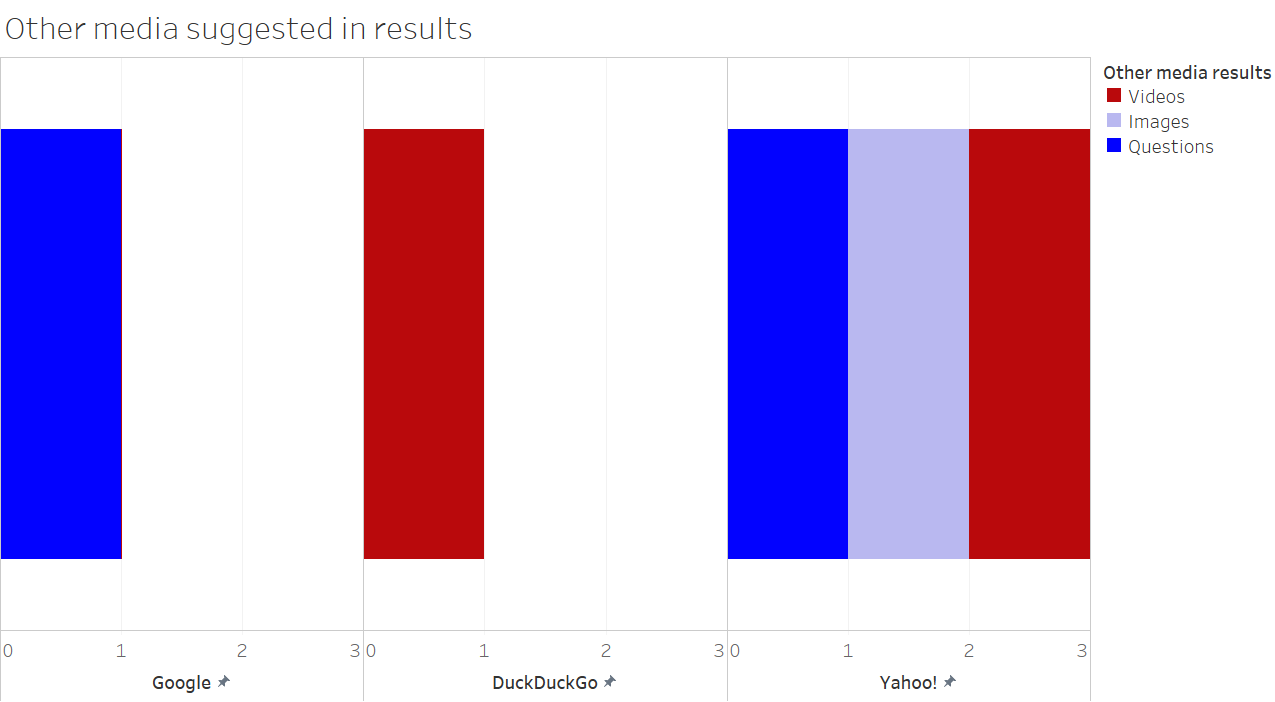"Detransition" results: data visualization
Comparing search results between Google, DuckDuckGo, and Yahoo!
Last month I wrote a longer article on how searching the word “detransition” differs on different search engines. This week, I chose to do this again because I wanted to create some data visualizations while I still had access to Tableau, as my contract in Germany will be ending at the end of this month. It should be noted that since I wrote the previous article, the search results are slightly different. I also did my searches in France, with my settings set to English, and used an incognito window. I have also included data from Yahoo!, in addition to Google and DuckDuckGo. Like previously, I only chose to focus on the first page of results, as most users will not look beyond.
As I have previously written about, during the pandemic I was going down various YouTube rabbit holes, usually listening to interviews as I cooked, cleaned, or crocheted. One of these interviews that I came across was of Abigail Shrier, a journalist and author of the book, Irreversible Damage, who investigated and published a book about the large increase in teenage girls identifying as trans (something crazy, like 300%). She has mentioned that she knows and is friends with trans people, but these girls are specifically experiencing social contagion, similar to eating disorders in behavior and the way it spreads. This theory was even confirmed by Yale sociologist, Nick Christakis, amongst other professionals in related fields. A doctor named Lisa Littman coined the term Rapid Onset Gender Dysphoria, to describe this cohort of trans identifying youth. Now, under the affirmation model, these children can seek out a process of irreversible high-risk medical transition with very little safeguarding than in previous generations. Consequently, there has also been a rise in detransitioners, ie. people who regret their transition and who also feel that their motivations or often exisiting co-morbidities (or simply just neurodivergence) were not questioned or examined. In other words: medical malpractice.
Detransitioners are extremely marginalized, as they are a minority within an already marginalized population. They often do not return to their gender care providers as many do not even acknowledge their existence and insurance usually does not cover detransition care. As well, to question or criticize trans healthcare or the trans movement within the mainstream, could risk you being called transphobic, get you banned from social media, and in some cases can even put your career at risk. These are just some aspects of what is going on within the gender discourse, as the rabbit hole seems to be unending. Upon seeing this interview of Abigail Shrier, I was greatly disturbed and I needed to know more.
After my inititial discovery, I called a friend of mine that was finishing his master’s in art therapy and was about to begin a position at a private practice that focused on “trans youth” using the affirmation approach. I felt morally obligated to warn him both professionally, as well as personally. He identifies as non-binary and had also been considering cross-sex hormones. Being an immuno-compromised person and already at risk for cancer, this would be incredibly dangerous to his health. We know this already. We know that even when a person takes synthetic hormones of their own sex, this is not healthy, let alone taking cross-sex hormones. We know this already, and there have even been previous medical scandals proving this to be the case. Just go listen to what Dr. William Malone has to say on the subject, an endocronologist that has been sounding alarms on the current medical crisis. Or see the paralells between gender healthcare and the lobotomy. At the time, I did not have as much information as I do now to properly articulate myself and I still find myself very aware that if I do not use a very strict set of politically correct language, people will think I am transphobic. The fact that being concerned about real medical harm being done to people and pointing to these realities makes one transphobic is very strange. The day I discovered Abigail Shrier I was in a state of shock that made me sick to my stomach to imagine such horrying things could be happening that are being so dishonestly represented. I spoke to my friend with urgency and he brushed me away as if I was being paranoid. It took maybe three phone calls to have him acknowledge that none of this healthcare is reversable. And its happening to children.
This was about a year and a half ago, and we have not really discussed the subject since. For me, it feels like a bit of an elephant in the room, like I have to hide my true opinions, continue pretending like I am still a believer, and begrudgingly respect pronouns even though they have come to represent something very sinister to me. I wonder if he is avoiding it, thinks it does not have any connection to his life, or if he has simply forgotten. I am frustrated, and uncomfortable by this. It is difficult for me to understand why people who are supposedly on the side of “science”, or on the side that defends minorities, would choose to look the other way towards this specific population. They have no problem standing up for “trans rights”, why not detrans rights? The population of detransitioners that were often desperate to alleviate pain or confusion in seeking out medical transition, only to recieve essentially legalized-self harm and body-mutilation (to put it bluntly), that will affect them for the rest of their lives. It seems that people either do not care, or do not realize the gravity of such a situation.
The difference in search results, may seem subtle, though do not underestimate the power of engineered information for public access. As it can be seen in the above image, Google clearly has a bias towards representing information from LGBTQ+ organizations over ones with a focus on detransitioners. This is not to say that the LGBT community is at fault, but that as the acronym gets larger, it actually represents less and less individual members of sexual minorities, and more a political movement, or a medical lobby for trans related healthcare. And as the LGB Alliance advocates for, a conflation between LGB issues and trans issues, has been very misguided and often very harmful (for both parties). The defensiveness on trans issues, probably comes from a good place from most people, an overcorrection to the wrongs that were done against gay people in the past. Something else to note from the image below, is that Google’s UI design makes it appear that there is far more information, though it had the same number of results as DuckDuckGo, where I felt I experienced much less “information overload” while using. As most people use Google by default, and if Google has a bias towards a certain side of the discourse, then most people are consuming biased information.
Before discovering this phenomenon even existed, I naively believed that being trans had a proper, formal, and clear diagnosis, and that should children medically transition, there must be strict gatekeeping and protocols to do so. This is not at all the case. For the average individual, this is not an issue they think about unless they have to face it in their personal lives, for themselves, or a loved one. Over the years I have had many friends that are trans-identifying, and while sometimes I did not always fully understand their perspective or what they were experiencing, I had a live-and-let-live mentality, always tried to be supportive, and certainly had no qualms respecting pronouns.
Since 2015 however, I have noticed evolutions in the language and shifts in friends’ perspectives that sometimes caused me to do a double take. During the pandemic in particular, many people, either close to me or ones that I used to know, medicalized. In some of these cases, it was becoming clear to me that this is a far more complicated issue than I previously realized, and there is usually more happening beneath the surface and behind closed doors when an individual makes these decisions to trans-identify and/or medicalize. This reality is not something being covered much in the mainstream media. Mostly conservative networks have discussed detransitioners, when it really should be a bipartisan issue. And on liberal networks, they usually have the perspective that conservatives are merely transphobic bigots. Instead of having productive conversations about better access to mental healthcare and safeguarding for minors, the culture war rages on.
In the image below, you can also note the difference in multi-media results. Yahoo! had the least website results, but the most options for image, video, and Q&A results, appearing to be designed to resemble a bit more like tabloids. While Google offered many Q&A results, though the answers were always pulled from the websites already being suggested. DuckDuckGo only recommended videos, though it is a notable difference, as YouTube is increasingly the best source to hear first hand accounts from detransitioners. Corinna Cohn, a transsexual and web-developer advocating for improvements in trans healthcare and child safeguarding, has previously mentioned that she has a contact at YouTube who has told her that detransitioner videos are an emerging trend on the website. While detransitioners and this medical scandal is still being heavily censored, we can probably expect much more of this in the future, supporting the theory that the future of the trans community, are detransitioners themselves.
Every friday I now listen to the new episode of Gender: A Wider Lens, a podcast hosted by Stella O’Malley and Sasha Ayed, two psychologists that work with youth struggling with their gender. They offer a sympathetic and evidence-based approach, which they call “gender exploratory”, and are very critical of the affirmation model. Now, I know where to look to get alternative perspectives of these debates that allow me to better understand both the right-wing and left-wing perspective of the discourse. Since learning about this almost two years ago, I have gone through an evolution of opinions as I learn more of the research, first hand accounts, and as more is revealed about the things currently happening within the healthcare establishment. I have also noticed a shift since I first learned of this phenomenon, as more detransitioners are speaking out, the mainstream media has at least begun to acknowledge the existence of this issue. Even if it is not always done so in the most honest way, at least it is being somewhat acknowledged. I keep imagining that more people I know must be becoming more aware, as the trends show that more parents are speaking out for parental-rights, amongst others concerned.
But then I will speak on the phone with my friend in New York. He tells me that work has been busy, but good. He’s been doing a DBT training and is studying for his license exam. He tells me that the person he’s dating is on T and has been preparing for top surgery later this year, but she’s going to keep her vagina. He tells me that it’s a nice relationship, but they’re both not sure what they want out of it because he wants kids and she doesn’t. He’s almost 30 so he has started to think about this more often now. I hang up feeling uneasy that he seems very removed from or unaware of what is happening. The average person cannot be expected to follow this or be as deep in the rabbit-hole as I, but he works with children using the affirmation model. He also has the ability to refer his clients to gender clinics, without really knowing the full scope of how they administor care (it is usually immediate medicalization, with little evaluation).
I have stopped bringing up the issue with him, because I do not think there is anything more I can do. Instead I have to tread carefully with what I say, because anything that is slightly critical or not exactly the same as the current political narrative, will be recieved with skepticism, fear, and defense. I am saddened that what I will now always refer to “information apartheid”, has created barriers and distance between friends, family, and society at large. People misunderstand that these views as criticizing trans individuals themselves, when this is not the case. When people criticize the “trans community”, what they usually mean is Trans Rights Activists or clinicians in gender clinics, who at this point should not be seen as that different than the pharmaceutical lobby or conversion therapists. In reality, criticizes of this nature, are really in concern for trans-individuals, as many might end up detransitioning. What detransitioners prove is that gender identity is not a stable concept, and that while one might initially experience euphoria from transition, this might not be stable either. For example, it has been mentioned that males tend to show regret after a longer period than females, it also could be that we hear from them less because males experience more shame and less support when they detransition. There are very few longterm studies on medical transition, so to say that there is only longterm benefit is simply not backed by any evidence. And if individuals never detransition and are indeed happy with their transition, that’s great, but it does not change that there are many that will. In addition, they will still likely face longterm and irreversable health-risks that should be discussed openly and honestly so that they can make informed decisions.
My views are pretty average, moderate, and quite sympathetic to the complexities and nuance of what is happening. In reality, my views are the average views of the majority of society. Yet, there is a loud minority that suggests that the majority views, as well as factual data, are extremist, transphobic, and bigoted misrepresentations. How this issue has come to the state that it is, is truly unbelievable, and I understand why many people might have a difficult time wrapping their minds around it. Even to suggest that it is the trans community against the world is dishonest, when there are many trans people speaking up for detransitioners and biological reality such as Buck Angel, Blaire White, Corinna Cohn, Aaron Terrell, Aaron Kimberly, and Scott Newgent to name a few.
I sincerely believe that adults should be free to decide what they should do with their bodies under proper informed consent, but this is not what is currently happening. As well, one must look at the difference in the vast amount of procedures and health care options offered for medical transition: all have longterm irreversable risks, but at varying degrees. For example, some bottom surgeries have a 70% complications rate and there is even evidence that there is an increase in likelihood of suicide after surgery. I seriously question the ethics of these entirely experimental and extremely dangerous procedures.
It is still concerning that this is happening to adults, and I deeply sympathize with those that realize that they regret their choices, as they were often due to prior trauma. While I still consider these adults exploited by the healthcare system and a dishonest representation of the reality of medical transition, they are adults, so the conversation will be different. What is difficult for me to understand, is why the conversation is so complicated when it comes to children. If you do not believe that children can consent to sex, or be mature enough to consume drugs, alcohol, vote, get married, join the military, etc. Then how are they able to consent to puberty blockers, a lifetime of medicalization, the cutting off of healthy body parts, infertility, and possibly a total loss of sexual function? It should also be noted that the human brain is not fully developed until the age of 25, and that 80% of children that experience gender dysphoria, will outgrow it in puberty. If one looks at what is currently known about medical transition, it is pretty clear that most of this medical care is not being done with the patient’s best interest in mind. Other than making the pharmaceutical industry and surgeons a lot of money, there is very little evidence that there are any long-term benefits.
I debate with myself whether I should continue bringing this up with friends. Its an uncomfortable subject for many, but I do believe it is important to be aware of. Especially if one does have trans individuals in their lives that they care about. I cannot imagine how difficult it must be for parents being emotionally manipulated into medically transitioning their child by the phrase, “would you rather have a dead child or a trans child?”—to which the mainstream narrative of suicidality amongst trans people is not so simple, and can also be debunked. As well as the many accounts that medical transition make some people’s gender dysphoria worse.
Regardless of what one believes or what side they are on in this debate, and whether they choose to avoid looking at the data, reality and truth will always win. Even if the media organizations, medical insitutions, and others pushing this healthcare and propaganda, deny that they ever did, there will be many that will know otherwise, and remember what side they were on. The existence of detransitioners alone will be enough proof.







You've absolutely nailed it, beautifully written